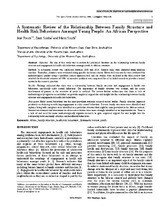A systematic review of the relationship between family structure and health risk behaviours amongst young people: An African perspective
Abstract
OBJECTIVE: The aim of this study was to review the published literature on the relationship between family structure and engagement in health risk behaviour amongst youth in African countries.
METHODS: A systematic review was conducted between 2000 and 2014. Suitable titles were identified from database searches. Thereafter, abstracts were evaluated along specific inclusion criteria. Eleven full text articles were evaluated for methodological quality using a modified critical appraisal tool and six studies were included in the final review that satisfied the threshold criterion of 70%. A narrative synthesis was completed for all included records to provide a textual answer to the research question.
RESULTS: Findings indicated that there was a relationship between family structure and engagement in health risk behaviour, specifically risky sexual behaviour. The importance of family structure was evident, and the active involvement of parents in the activities of youth is cardinal. The review further underscores that there is lack of methodologically rigorous research that can provide empirical support for and insight into the relationship between family structure and engagement in health risk behaviour.
DISCUSSION: Risky sexual behaviour was the most prevalent outcome assessed across studies. Family structure impacted positively on delaying or reducing engagement in risky sexual behaviour. Diverse family structures were identified and orphans living with caregivers were identified as a particular structure that might be more prevalent in the African context. Parental involvement and investment in adolescent activities were more strongly identified as an important factor. There is a lack of and need for more methodologically rigorous research to gain empirical support for and insight into the
relationship between family structure and health risk behaviours.

